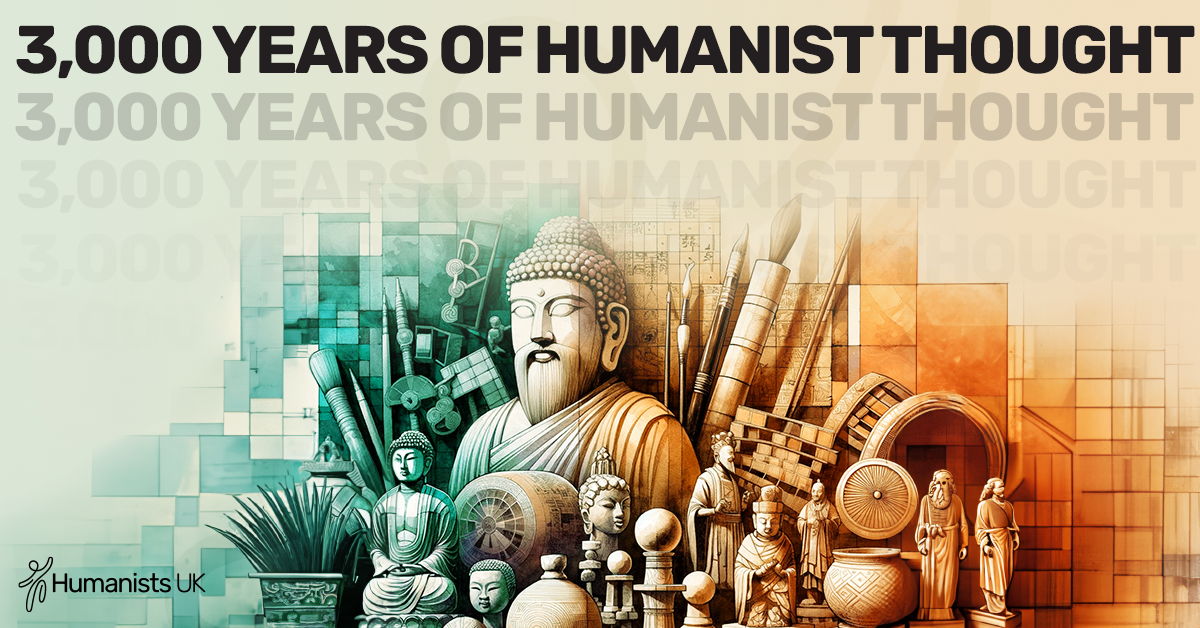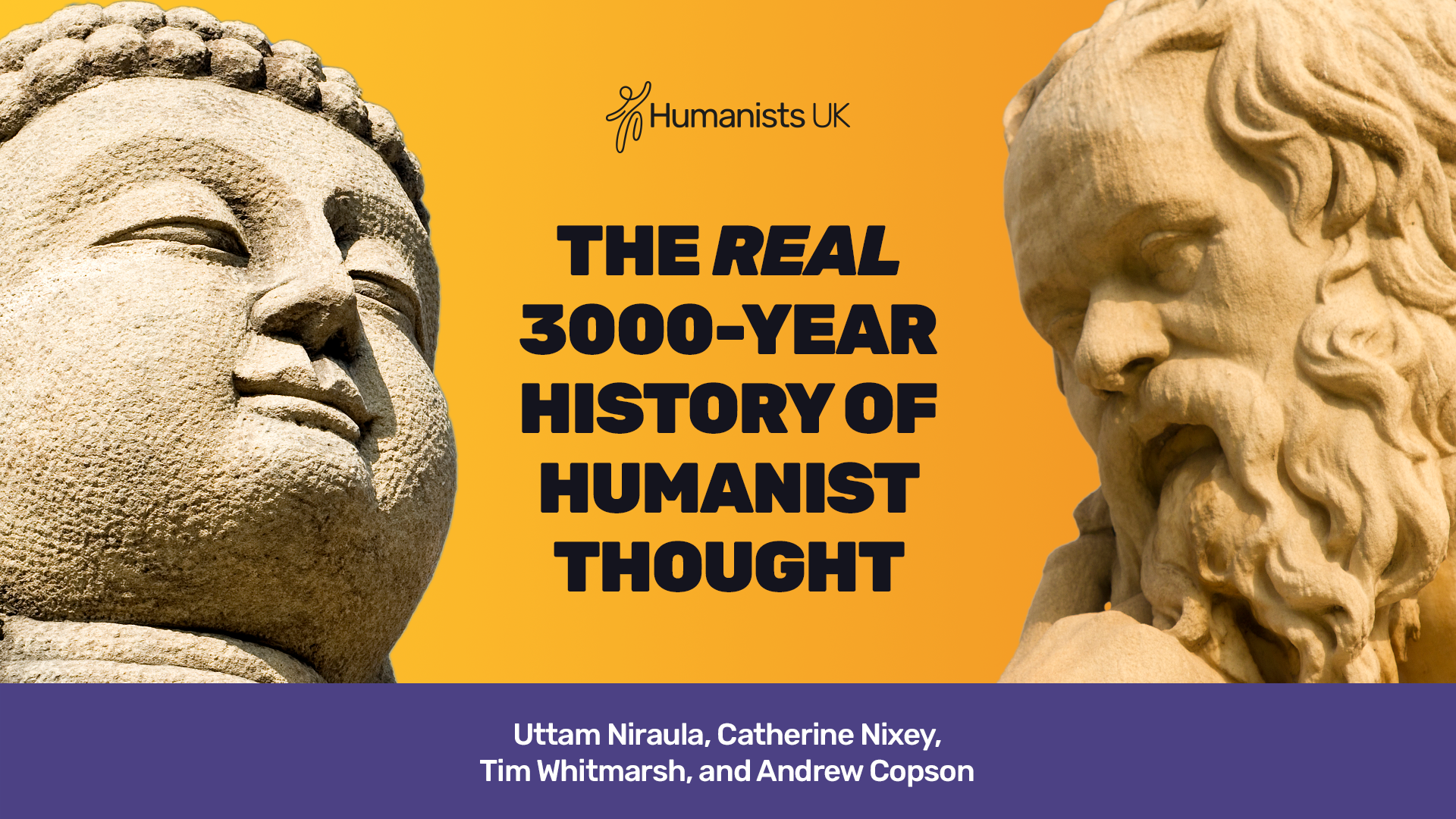
On 18 January, experts in humanism, ancient Greece, and ancient Nepal and India will come together for a stimulating conversation about the ‘long’ history of humanism around the world, exploring the continuities between people who ‘think for themselves and act for everyone’ in the ancient world and today.
This promises to be a fascinating online event covering questions such as ‘What is morality?’, ‘Do human beings need religion to be good?’, and ‘How did today’s modern liberal values originate?’
Ancient humanism
In the earliest human civilisations, there were many people whose approach to life was what today we could call humanist: think for yourself, act for everyone.
As far back as records go, there is ample evidence – some fragmentary, some extensive – of people who believed this was the only life we have, that human beings were the makers of their own fate, and that notions of gods were, at best, a distraction from the meaningful work of making a happy life among human beings. Historians can trace the lineage of this kind of thinking – ideas and approaches to life we now would group together as ‘humanism’ – through Western and Eastern philosophy, influencing politics, social movements, art, and even religions along the way.
At a time when many are pushing ahistorical claims that Christianity lies at the heart of British or Western or human values, or was otherwise exceptional or pivotal in the development of our species’ understanding of right and wrong, we will be looking at the real history of humanist thought, from early Indian, Greek, and Roman sources, through Dark Ages, renaissances, and periods of Enlightenment, through to today’s humanists, today’s mainstream common sense, and the amazing stories on our Humanist Heritage website.
Join The Darkening Age author Catherine Nixey; founder of Society for Humanism Nepal, Uttam Niraula; and historian and A. G. Leventis Professor of Greek Culture Tim Whitmarsh for an exploration of the real 3,000-year history of humanism, chaired by Humanists UK Chief Executive Andrew Copson.
The debate about morality
A humanist will usually take the view that human morality came before the invention of human religions.
That is to say, that we as human beings evolved cooperative instincts and refined them over generations by thinking about human problems and the consequences of our actions. This very human inheritance is the reason for our survival and has been hardwired into our nature through thousands of years of evolution. Religions, along with other attempts to codify, explain, pass on, or promote particular sorts of behaviour, came later.
There have always been people who led good, even excellent, very moral lives without religious beliefs.
The contrary religious view is that all of morality comes to us from on high. At a particular point in time in human history, humans were out of control, until gods or angels or divine ghosts came along and bequeathed moral rules to mankind. In this view of life, morality isn’t something humans evolved out of necessity in order to survive and find happiness, but it was handed down to us, sometimes in the form of a cosmic rule book. Different religions will claim the source as different gods and different prophets. Most will say their own cocktail of rules offers the true approach and the best guide to true morality.
The latter view long ago fell out of favour as being self-evidently not true, from even the most cursory looks at human history, owing to the study of how religions evolved and emerged, the weak evidence put forward for truth claims made by religions, and the fact that it is impossible to reconcile all the thousands of competing claims from different religions who claim to own the one true source of all human goodness.
But in the last few years, there has been a new push in the publishing world which claims a variation on this: that religion, and frequently Christianity in particular, has in fact been the source of the world’s most civilised values. They will usually argue that religion is necessary for morality, and that even humanists who lead moral lives are actually are living by moral frameworks that are inescapably religious in origin.
This view is of course not just offensive to humanists and non-Western cultures, but also straightforwardly untrue. It is a reading of history which relies on leaving out all the parts of the world where civilisations and schools of moral philosophy prospered, and yet monotheistic religions never took hold (such as China). It also depends on the believer rejecting as distractions or somehow irrelevant all the clear, strong continuities between pre-Christian moral philosophy, moral thinking, and today’s values, as well all the evidence from biological and social sciences about how human morality likely developed. These partisan readings of history typically downplay most of the barbarities of institutional religions in Western history, while zooming in on the barbarities and ritual cruelties of the ancient world, to somehow claim that the relative everyday benignity of the modern secularised West is in fact the ultimate fruit of religious teachings.
Some see these arguments as a response to the decline of religion in the West. The argument can be seen as a kind of ‘grasping at straws’: that even the non-religious, largely functional, and relatively secularised world many of us live in happily today is really, perhaps secretly, a product of religious teachings. All the good things done in the name of religion can be claimed for religion, and so too can all the good in the world done in spite of religion, or without any regard for religion!
In a more balanced view of history, it seems obvious that different views of human morality and conduct were developed in both religious and non-religious contexts, with an incredible diversity among and between them, and many ideas and teachings from these parallel schools of thought clearly influenced each other throughout history. But no religion and no non-religious philosophy can claim to have been the exclusive source of all human morality.
Humanist thinking has of course been around for as long as human beings, because as an approach to life it can be arrived at by anyone, anywhere, using simple logic and intuition. There have always been people who looked to the world around them and sought non-supernatural explanations for what they say, and saw in humanity and community motive to be good and treat others as they would like to be treated.
In our upcoming event, we’ll go back to the very earliest non-religious thinkers, and attempt to tell a more complete story: ‘The real 3,000-year history of humanist thought.’
📺 VIDEO: Humanist history – from radical ideas to common sense
Watch our new Humanist Heritage video narrated by Hannah Peel for a quick primer on the development of humanist thinking from its ancient roots to today’s global social movement.


